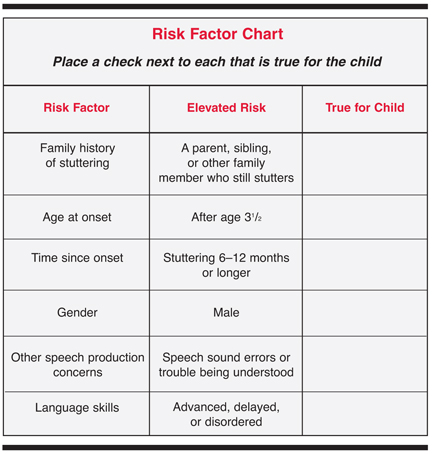
Blog by Voon Pang, Aug. 28, 2013
When I read headlines that say “One in Ten Children Stutter, But It’s No Big Deal” or “Study: Preschoolers’ Stuttering Not Harmful,” I tend to think of the implications they have for the time constrained parent or doctor. We all live in a world where lives have become busier, social media is part of the norm and we get to access new information quicker than ever before. I believe that this has made us more prone to skipping over important details and not trusting our instincts with what we feel is right for us (or our patients).
Let me share with you a quick personal story about trusting your instincts and asking for help. About two years ago, I noticed that a mole on my shoulder had changed colour and I started frantically panicking and thinking about skin cancer and my future. I didn’t help the cause by "Googling" as much information as I could and confused myself with different images of what was a melanoma or what was an ordinary mole. Eventually, I sought help and got a mole scan, which put my mind at ease. It turned out that I had two moles, which looked sketchy with both having the potential to be cancerous (fortunately, the biopsy results revealed that they were both non-cancerous – let me tell you, the wait for the results was worse than the operation). I think the process of seeking help for stuttering can be similar. It is pretty darn scary and the unknown can be overwhelming…
Which brings me back to the original headlines and the latest research done by Australian researchers. Yes, there were some interesting findings, which looked at recovery from stuttering, language profiles, social emotional-development and temperament of 4 year olds who stuttered. No, this does not discount the fact stuttering can have an adverse affect on one’s life if left untreated, particularly in the early years. Even though the latest research highlighted that children who stuttered did not have lower scores on mental health, wouldn’t it be better to have therapy and prevent any social-emotional or negative impact stuttering has than leave it up to chance? Also, when parents feel supported, anxiety levels drop and confidence increases in helping their children. Let’s not forget that each family who participated in this research had a speech-language pathologist visit every month to check on the child’s stuttering. In the real world, a speech-language pathologist does not conduct monthly check ups, unless you pay for one. It is up to you to be proactive in seeking help.
In terms of being a savvy consumer, look up qualified specialists in the field of stuttering and make contact. Email, ring or chat to a person who knows what they are talking about. Make sure you feel listened to and that you have options to consider before you decide to commit to or delay treatment for your child. Have an evaluation if need be, at least it will put your mind at ease. A great starting point is the referral list on the Stuttering Foundation's website - http://www.stutteringhelp.org/referrals-information or the Board Recognised Fluency Specialists list on http://stutteringspecialists.org/index.php?option=com_comprofiler&task=usersList&listid=4&Itemid=508&limit=30&limitstart=0
Research can help us make informed decisions, but go with your gut, trust your instincts and be an advocate for your child (or patient). It’s not that scary and you’re not wasting anybody’s time. Whenever I get off the phone with a family, I always commend them on taking that first step in exploring what they can do to help their child or loved one and I make sure that they feel supported.
To the Doctors and Paediatricians – do not tell parents of children who stutter to wait and see or say, “They’ll grow out of it”. Help parents make contact with a speech-language pathologist or refer them to one who specialises in stuttering. The clinic I work in has seen two cases where a 7 year old and an 8 year old has missed out on getting early help because their parents were told to wait. To the parents of both children and the children themselves, stuttering has become a ‘big deal’ and therapy is just that more difficult compared to if they were seen in their preschool years.
I hope this helps families (and doctors/paediatricians) who are confused by those headlines.
Until next time,
Voon






 Podcast
Podcast Sign Up
Sign Up Virtual Learning
Virtual Learning Online CEUs
Online CEUs Streaming Video Library
Streaming Video Library